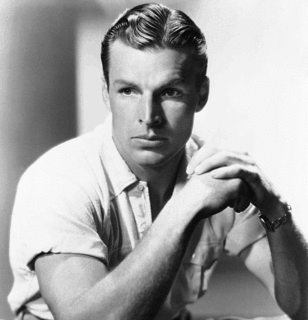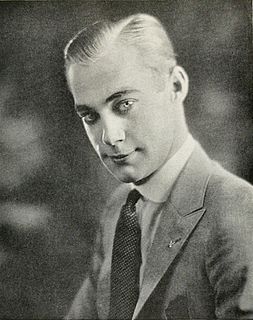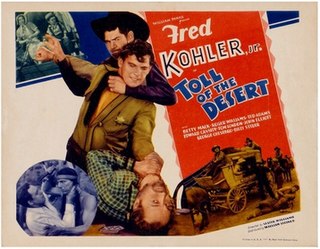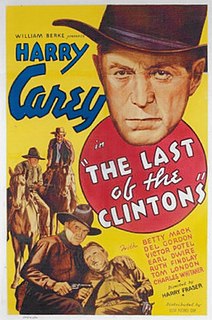
Clarence Linden Crabbe II, known professionally as Buster Crabbe, was an American two-time Olympic swimmer and film and television actor. He won the 1932 Olympic gold medal for 400-meter freestyle swimming event, which launched his career on the silver screen and later television. He starred in a variety of popular feature films and movie serials released between 1933 and the 1950s, portraying the top three syndicated comic-strip heroes of the 1930s: Tarzan, Flash Gordon, and Buck Rogers.

Producers Releasing Corporation was one of the less prestigious of the Hollywood film studios. It was considered a prime example of what was called "Poverty Row", a term originally applied to a stretch of Gower Street in Hollywood known for being the headquarters of a plethora of low-budget production companies, mainly because the rents were cheap. Many of these companies would make only a few low-budget "B" pictures, then disappear; others, like PRC and Monogram, lasted for a longer period of time and some even had their own studio facilities. PRC lasted from 1939 to 1947, churning out low-budget B movies for the lower half of a double bill or the upper half of a neighborhood cinema showing second-run films. The company was substantial enough to not only produce but to distribute its own product and some imports from the UK, and operated its own studio facility, first at 1440 N. Gower St. from 1936 to 1943, then the complex used by the defunct Grand National Pictures from 1943 to 1946, located at 7324 Santa Monica Blvd. This address is now an apartment complex.

Jean Rogers was an American actress who starred in serial films in the 1930s and low–budget feature films in the 1940s as a leading lady. She is best remembered for playing Dale Arden in the science-fiction serials Flash Gordon (1936) and Flash Gordon's Trip to Mars (1938).
Poverty Row is a slang term used to refer to Hollywood films produced from the 1920s to the 1950s by small B movie studios. Although many of them were based on today's Gower Street in Hollywood, the term did not necessarily refer to any specific physical location, but was rather a figurative catch-all for low-budget films produced by these lower-tier studios.

Al St. John was an early American motion-picture comedian. He was a nephew of silent film star Roscoe "Fatty" Arbuckle, with whom he often performed on screen. St. John was employed by Mack Sennett and also worked with many other leading players such as Charlie Chaplin, Buster Keaton and Mabel Normand. His film career successfully transitioned from the silent era into sound, and by the late 1930s and 1940s he was working predominantly in Westerns, often portraying the scruffy comedy-relief character "Fuzzy Q. Jones". Among his notable performances in that role are in the "Billy the Kid" series of films released by the Producers Releasing Corporation from 1940 to 1946 and in that company's "Lone Rider" series from 1941 to 1943.

Riot Squad is a 1933 American Pre-Code crime film directed by Harry S. Webb and starring Madge Bellamy, Pat O'Malley and Addison Richards. It was produced as a second feature and distributed by the independent company Mayfair Pictures.

Million Dollar Legs is a 1939 American comedy film starring Betty Grable, Jackie Coogan, John Hartley and Donald O'Connor.

Sally of the Subway is a 1932 American pre-Code crime film directed by George B. Seitz and starring Jack Mulhall, Dorothy Revier and Blanche Mehaffey. It was produced as a second feature for release by Mayfair Pictures.

Passport to Paradise is a 1932 American drama film directed by George B. Seitz and starring Jack Mulhall, Blanche Mehaffey and Eddie Phillips. It was produced as a second feature for release by the independent company Mayfair Pictures. The film is now considered to be lost.

The Oil Raider is a 1934 American action film directed by Spencer Gordon Bennet and starring Buster Crabbe, Gloria Shea and George Irving. It was produced on Poverty Row as a second feature and was distributed by independent company Mayfair Pictures.
The Billy the Kid series of 42 Western films was produced between 1940 and 1946, and released by Poverty Row studio Producers Releasing Corporation.

Gun Grit is a 1936 American western film directed by William Berke and starring Jack Perrin, David Sharpe and Roger Williams. It was produced on Poverty Row as a second feature. The film is also known by the alternative title of Protection Racket in the United Kingdom.
Budd Leland Buster, usually credited as Budd Buster, was an American actor known for B western films. He sometimes was credited as George Selk in his later work.

Toll of the Desert is a 1935 American western film directed by William Berke and starring Fred Kohler, Jr., Betty Mack, and Roger Williams.

The Bounty Killer is a 1965 American Technicolor and Techniscope Western film directed by Spencer Gordon Bennet, written by Ruth Alexander and Leo Gordon, and starring Dan Duryea and Rod Cameron. The supporting cast features Audrey Dalton, Richard Arlen, Buster Crabbe, Fuzzy Knight, Johnny Mack Brown and Tom Kennedy. Broncho Billy Anderson, the cinema's first Western film star, makes his final appearance in the film. The film was released on July 31, 1965, by Embassy Pictures.
Fighting Lady is a 1935 American drama film directed by Carlos F. Borcosque and starring Peggy Shannon, Jack Mulhall and Marion Lessing. The film was a low-budget Poverty Row production, distributed in some regions by Majestic Pictures.
Mayfair Pictures was an American film production and distribution company active between 1931 and 1934 during the early sound era. It grew out of Action Pictures, another low-budget studio location on Poverty Row. It was established by the producer Ralph M. Like and was located at the former Charles Ray Studios in Hollywood.
Lester F. Scott Jr. (1883–1954) was an American film producer of the silent and early sound eras. He specialized in producing western films, many of them directed by Richard Thorpe.
George W. Weeks (1885–1953) was an American film producer. During the early 1930s he was involved with Sono Art Pictures and Mayfair Pictures. In the 1940s he released his films, including the Range Busters series featuring Ray "Crash" Corrigan, through Monogram Pictures.

The Last of the Clintons is a 1935 American western film directed by Harry L. Fraser and starring Harry Carey, Betty Mack and Victor Potel. It was the last film released by the Poverty Row studio Ajax Pictures before it closed down.













